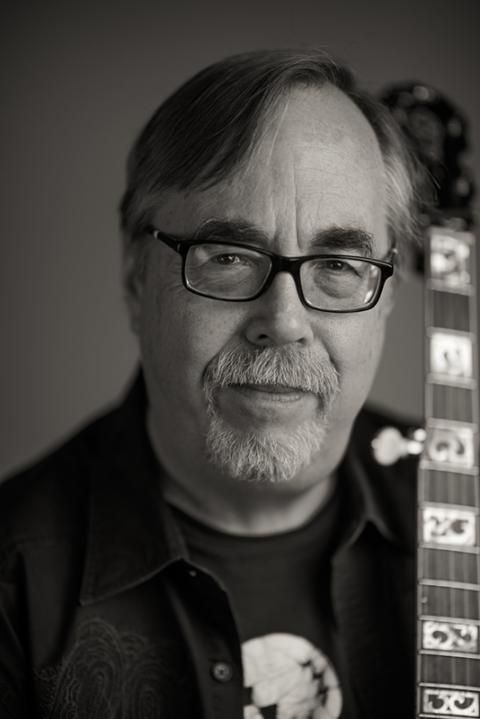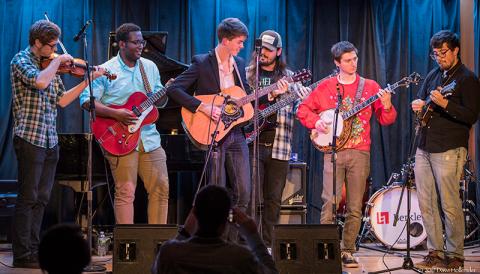Students Build Band with Guidance from Bluegrass Master Tony Trischka

With instruction from bluegrass legend Tony Trischka, members of Professor Dave Hollender’s Bluegrass Ensemble get together for three-part harmonies during their end-of-semester final recital in Berklee’s Oliver Colvin Recital Hall.
Image by Dave Hollender

Trischka says he hopes to leave students with a better appreciation of "how soulful" bluegrass music is in both his group and one-on-one instruction.
Image courtesy of the artist

Hollender’s bluegrass ensemble, tentatively titled the Wet Noodle Boys, is (from left to right): Devon Gardner, Chris Walton, Micah Nicol, Chris “C.C.” Ellis, Trevin Nelson, and Ari Wyner.
Image by Dave Hollender

"You only get one shot at it, so you’ve got to be prepared," Hollender told his students during an ensemble rehearsal. Here, the professor checks on banjo player Nelson's fifth string capo prior to the group’s performance for the class' final recital.
Image by Mike Keefe-Feldman

During the bluegrass classic "Rolling in My Sweet Baby’s Arms," Ellis’s upright "exploded"—the bridge collapsed and the fretboard detached from the instrument's neck. A student in the audience lent Ellis an electric bass and the band played on.
Image by Dave Hollender

In addition to the set of bluegrass standards, the band played an original by Chris Walton, "Hot Coffee"—a small taste of the steaming cup of soul he plans to unleash soon on his debut EP.
Image by Dave Hollender
"You sound great!" banjo legend Tony Trischka, a visiting artist with Berklee’s American Roots Music Program, tells Berklee student guitarist and vocalist Chris Walton. "Your singing is just off-the-wall!"
Walton is one of several student members in Berklee Professor Dave Hollender's Bluegrass Ensemble. Huddled together in the classroom, the students are piecing together a very new bluegrass take on a very old blues song: Nehemiah "Skip" James's "I'm So Glad," which Walton sings with the appropriate fervor although he has only just learned the lyrics. With direction from both Hollender and Trischka, the group also runs through a rendition of "Say Goodbye (for KM)," the sparkling lead-off track from Trischka's 2014 Rounder Records release, Great Big World.
Multi-instrumentalist Micah Nicol, who is capping off his first semester at Berklee, strums his acoustic guitar and rips into the vocals—Thunder clouds are rolling / Lightning shines on the track / I’m waiting at the station / You thought you were coming back—before finding backup in the form of high lonesome harmonies from fellow student Ari Wyner on mandolin. Meanwhile, Walton, bassist Chris "C.C." Ellis, banjo player Trevin Nelson, and fiddler Devon Gardner exchange nods as the song's rhythm shifts, briefly, after the first verse.
To get the best results out of his students, Trischka, whose visiting artist stints at Berklee have included not only ensemble work but also one-on-one lessons, focuses first and foremost on what they are doing right. "I always accentuate the positive," he says. "Everyone’s trying to learn. I wouldn't want someone tearing me down, so I try to lift and build people up."
Balancing Act: Honoring Tradition While Innovating
For Trischka, a longtime music educator who has mentored the likes of Béla Fleck, it was a joy to watch the students take his song and run with it, as well as an opportunity—via the Skip James experiment—to balance the traditional with the experimental.
"I love bluegrass," Trischka says. "To hear Bill Monroe do it? Great. People have expanded it, for sure, but bluegrass hasn't really changed that much since 1945 when [Lester] Flatt and [Earl] Scruggs joined Bill Monroe at the Grand Ole Opry." Part of the reason Trischka presented Hollender's students with Skip James, he says, is because "I've always tried to tinker with the boundaries of bluegrass."
That's an understatement from the modest Trischka, whose impact on the genre has been monumental. In addition to his own critically acclaimed albums, he has recorded with fellow bluegrass leaders—including the legendary Scruggs—and produced for Steve Martin and the Steep Canyon Rangers, which included the incomparable experience of producing vocals for Paul McCartney and the Dixie Chicks.
"So I’m telling the Dixie Chicks, 'Why don’t you try this part?’' and I’m [thinking], 'Are you kidding? I'm a friggin' banjo player!'" Trischka says with a laugh. "But, I have the ears."
Watch a day in the touring life of Tony Trischka:
Trischka is soon to release a new U.S. Civil War-themed concept album that has been 10 years in the making, This Favored Land. The album interweaves stories of an enslaved African gravedigger, a riverboat gambler, a widow, and a great train robbery, among other threads, and Trischka says he'd like to see it become a theater piece in the future. The album's title comes from a phrase in Abraham Lincoln's 1861 inaugural address that Trischka came across in a book of Lincoln's speeches given to him by his son, Sean Trischka B.M. '16, a talented songwriter in his own right who, after graduating from Berklee, is now ensconced in the vibrant Boston acoustic music scene.
The Newgrass Surge
The elder Trischka, one of the most musically informed Berklee parents on the planet, says his son's Berklee experience clearly provided the recent graduate not only valuable connections in the music community, but "a deepening of his musicality." In addition to praising Sean's work, Trischka is quick to laud rising Berklee alumnae on the resurgent bluegrass scene such as recent International Bluegrass Music Association (IBMA) award-winners Sierra Hull B.M. ’11 and Molly Tuttle '14, as well as other up-and-coming artists such as Alex Hargreaves '13, Tatiana Hargreaves, Phoebe Hunt, Dominick Leslie '10, Sam Leslie '17, and John Mailander B.M. '13.
Trischka is also excited to see bluegrass surging beyond U.S. borders. "It's in Japan," he says with a twinkle in his eye. "It's something that reaches people, just like we all fell in love with Indian music in the '60s thanks to George Harrison."
That bluegrass surge came roaring to life on Friday, December 8, when Hollender's ensemble, now bonded as a band under the working moniker of the Wet Noodle Boys, took the stage in the Oliver Colvin Recital Hall for its final recital. The band performed admirably on bluegrass staples such as "Old Home Place," "Mr. Engineer," and "Rolling in My Sweet Baby's Arms" (on which they persisted through a broken bridge rendering Ellis's upright useless), and also brought its bluegrass instrumentation to student Chris Walton's original neo-soul song, "Hot Coffee," offering a healthy dose of that boundary-tinkering that Trischka so enjoys.
While the group closed the upbeat set with Trischka's "Say Goodbye," Hollender says the band doesn't intend to do as the song's title suggests; they will, in fact, continue playing together next semester, he says. The professor says all of them did well on their final exam—the recital—but that almost seems beside the point. The real reward is this: now they have a band.
Catch Berklee bluegrass musicians at the Joe Val Festival in February 2018.
